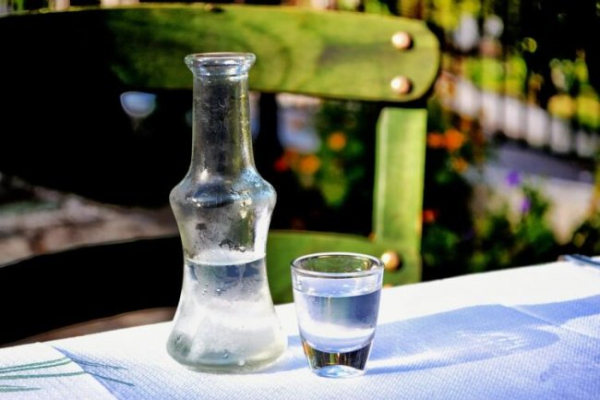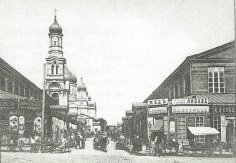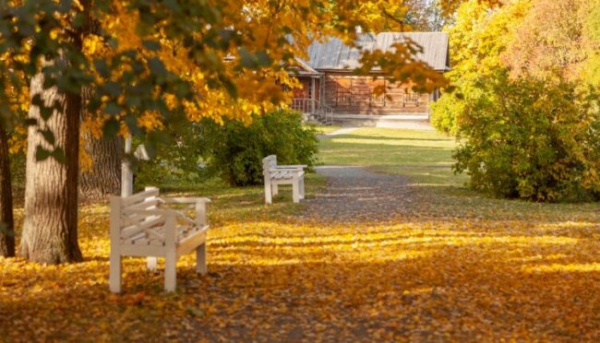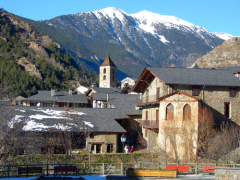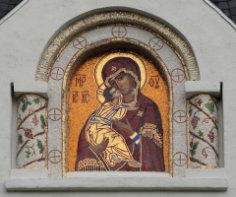
One of the main Orthodox holidays – the Protection of the Holy Mother of God – is celebrated on October 14.
The Feast of the Protection of the Most Holy Theotokos came to Russia from Byzantium and was established in the mid-12th century through the efforts of Saint Prince Andrew Bogolyubsky. According to legend, the feast's origins lay in an event that took place on October 14, 910, in the city of Constantinople, besieged by the Saracens, in the Church of Blachernae, where the robe, head covering, and belt of the Most Holy Theotokos were kept. Among those praying at the all-night vigil were Saint Andrew and his disciple Epiphanius. Looking up to heaven, Saint Andrew unexpectedly saw the Most Holy Virgin walking through the air, surrounded by angels and saints. Kneeling, the Most Holy Virgin prayed for a long time. Then, approaching the altar of the church, she removed her veil (covering) from her head and spread it over the people praying in the church, thus signifying the protection she bestowed upon the entire Christian world from its enemies. When the Mother of God departed, the veil became invisible.
This tradition reflects the widespread veneration of the garment (robe) of the Mother of God in Byzantium. In Orthodox Rus', the word “pokrov” referred to both the covering and the protection emanating from the image of the Blessed Virgin. It is to this protection that numerous victories of the Russian people are attributed. In 1165, in honor of the Protection of the Mother of God, the Grand Prince of Vladimir Andrei Bogolyubsky built the beautiful Church of the Intercession on the Nerl.
On the Feast of the Protection of the Most Holy Theotokos, believers pray for intercession, protection from all disasters, and the bestowal of grace. By this time, all agricultural work has concluded. The Feast of the Protection marks the first sign of winter, the possible onset of cold weather and frost. Before the Feast of the Protection, villagers preserved dried apple branches, believing that burning them on October 14th would ensure warmth throughout the winter. People judged the coming winter by the weather on the Feast of the Protection: if the cranes had already flown away, an early and cold winter would follow; if an east wind blows on this day, the winter will be cold; a south wind means a warm winter; and a west wind means a snowy winter. Snow on the Feast of the Protection foretells a snowy and cold winter, and if snow falls before the Feast of the Protection, winter will not arrive soon.
Moreover, weddings began in villages on October 14th. If snow falls on the Feast of the Intercession, the newlyweds will be happy, and if the weather is windy, there will be a great demand for brides, according to popular belief. On the Feast of the Intercession, girls would say, “Father Intercession, cover Mother Earth and me, a young one!” “White snow covers the earth: is it not fitting for me, a young one, to be married?” At this time, girls would gather together to spin flax and then weave the “everyday” shroud, striving to complete the entire work in one day. Before the Mass, the prepared linen would be carried to the icon of the Intercession of the Holy Mother of God, saying, “Mother of God! Cover me quickly, send a smarter suitor!”
On the Feast of the Intercession, homeowners began insulating their homes for the winter, “driving in the heat.” While working, they would say, “Get some warmth before the Feast of the Intercession,” “Mend your fur coat before the Feast of the Intercession, or there won't be any warmth.” While lighting the stove, housewives would recite special words: “Father Pokrov, heat our hut without firewood.” By the Feast of the Intercession, they would try to tidy up the hut and prepare as many treats as possible from the fruits of the new harvest. This holiday was also considered the last day for harvesting fruits and mushrooms. It was believed that on this day one could protect children from colds; to achieve this, they would pour water over a child through a sieve on the threshold of the hut.
If the Feast of the Protection of the Blessed Virgin Mary does not fall on a Wednesday or Friday, any food is permitted; otherwise, meat, dairy, and eggs are prohibited, and fish is permitted.
On the joyful day of the Protection of the Most Holy Theotokos, believers pray to their Intercessor: “Cover us with Your honest protection and deliver us from all evil, praying to Your Son, Christ, our God, save our souls!”
God bless you
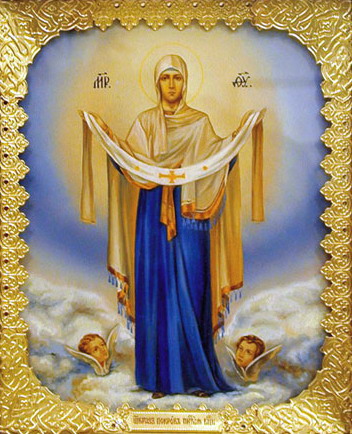
Icon of the Intercession of the Holy Mother of God


